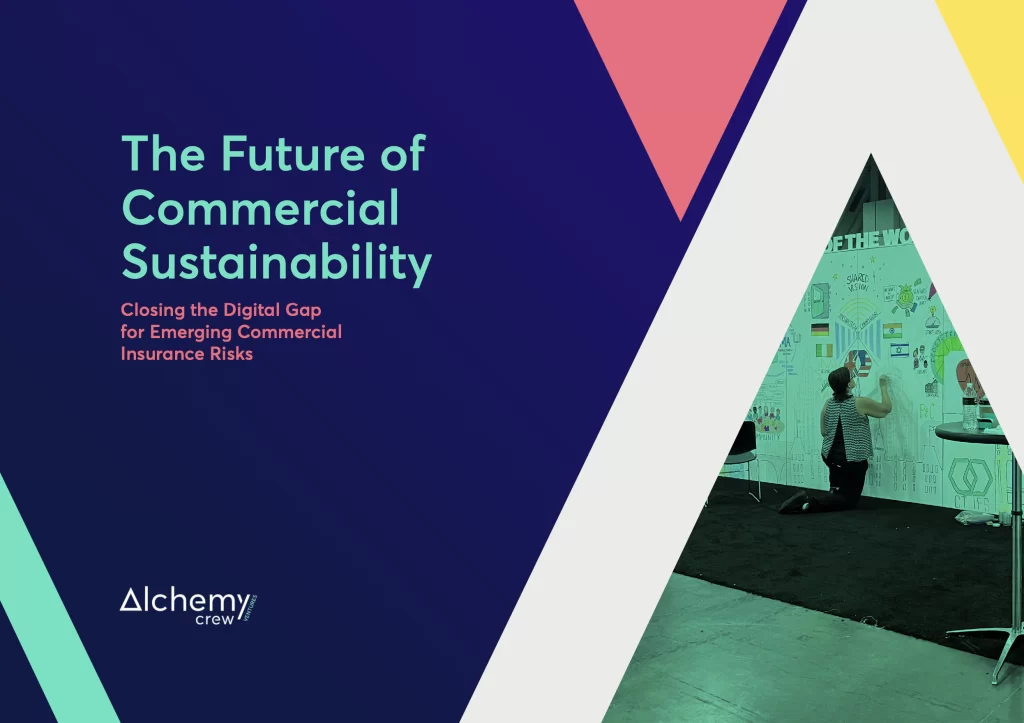Unlike many insurance leaders, Sabine VanderLinden actually chose a career in the insurance industry, because in her own words, “the people were great.”
A trailblazer in the technology and innovation space, her passion for startups and the entrepreneurial space has led her on many adventures, the most recent of which saw her launch her own company – Alchemy Crew Ventures.
She is also an advocate for diversity and says her happy place involves constant learning and strategising new ways to encourage insurtechs and established insurance companies to work together.
You’ve had a diverse career journey, and notably, you were appointed as one of Lloyd’s youngest regulatory officers. What’s your story?
Absolutely. It’s an interesting story. Back in 1996, when I started in insurance, Lloyd’s had its own regulatory team separate from the FCA. I was part of that team at Lloyd’s of London, serving as a regulatory officer. My primary responsibility was regulating the managing agencies and their syndicates at Lloyd’s.
How did you find yourself in the insurance industry in the first place?
Well, I moved from Paris to London for my studies, thanks to a grant from Erasmus. While studying at what is now called the London Metropolitan University or London Met, situated opposite Moorgate station, Lloyd’s used to visit the university to interact with students. They presented the opportunities at Lloyd’s, emphasising that it wasn’t just an insurance company but a marketplace, much like trading in the banking industry.
The prospect of assessing risks ranging from insuring satellites to celebrities and valuable art intrigued me. Lloyd’s encouraged us to apply once we completed our studies, offering various graduate training options in broking and insurance trading as well as within the Lloyd’s corporation. So, I fell into insurance through this recruitment process.
That’s a unique entry point. How did you choose between banking and insurance?
Banking’s culture felt too harsh for me during interviews, causing a fair amount of anxiety. In contrast, insurance was relationship-based, and people were genuinely kind. In 1996, I joined T.R. Miller, one of the top four brokers at the time, and became part of the international team, leveraging my French language skills to handle paintings, fine art, and celebrity insurance in France, Europe and the Caribbean. After three years in the market, I decided to pursue my MBA. This included a transition within the Lloyd’s corporation as a regulatory officer, where I met incredible people.

Could you shed some light on your responsibilities as a regulatory officer at Lloyd’s?
Certainly. As a regulatory officer, our main focus was on regulating the syndicates and managing agencies at Lloyd’s. The managing agency typically owns several syndicates, each trading business on the floor at Lloyd’s, making it a marketplace that aggregates various companies. Annually, we conducted reviews of these companies, assessing their finances and operations. This role provided a valuable skill set in understanding how businesses operate, the associated risks, and the regulations they must adhere to to avoid penalties.
As a regulatory officer, you were dealing with C-level executives, such as the CEO and CFO, essentially regulating them. Can you share more about that experience?
I found myself in meetings with C-level executives, including the CEO, CFO, and others, of the companies we were regulating at Lloyd’s. It was a hands-on role where they would present piles of documents for me to audit.
Every year, I had the task of reviewing around 15 to 20 managing agencies and syndicates, ensuring compliance with regulations. Some would face fines due to poor practices. I can’t recall exactly when the decision was made to transfer the regulatory office from Lloyd’s to the FCA, but at some point, the team either disbanded, took on new roles at Lloyd’s, or became part of the FCA.
Could you walk us through your career after Lloyd’s, leading up to the decision to launch Alchemy Crew Ventures?
After Lloyd’s, I pursued my MBA and had the opportunity to return to Lloyd’s. However, my interest in customer experience and technology, explored in my thesis, led me to IBM. They were keen on building a consultancy within a technology company. Joining IBM as a strategy consultant, I used my insurance background and regulatory experience to work with major insurance companies. Over my eight years at IBM, I focused on value creation, specialising in technology to help clients understand the need to invest in IBM’s stack and partners.
I then transitioned to FICO, a company specialising in predictive analytics, particularly in risk management. This experience led me to another company called Chordiant now part of Pegasystems, focusing on customer experience using the same types of technology. Both experiences gave me a strong lens of deal making, commercialisation and how to drive business value from technology.
Your role at Startupbootcamp InsurTech involved accelerating over 100 startups and collaborating with global insurance companies. Can you tell us about that?
Startupbootcamp InsurTech allowed me to create and execute impactful programmes both in the United States and Europe. The goal was to accelerate startups and facilitate collaboration with global insurance companies. I developed and implemented initiatives that provided corporations with frameworks and tools to engage effectively with startups and for startups to be ready to do the same.
One of the key programmes I introduced and evolved was the co-creation labs, a novel approach where one insurer collaborated with multiple startups. This model aimed to enhance collaboration efficiency by streamlining the process between large corporations and innovative startups. As the insurance landscape evolved, so did the acceleration model, and these initiatives were instrumental in fostering meaningful partnerships between startups and corporations. This is what got me to set-up Alchemy Crew Ventures.
Your approach at Alchemy Crew Ventures is quite unique, positioning it as a virtual lab rather than a traditional consultancy.
Alchemy Crew Ventures is not really a consultancy as we only work on programmes with corporations. We deliver and operate virtual venture labs. The three pillars of our services include investment, commercialisation, and go-to-market strategy which are the three main pillars of Corporate Venturing. So, we help startups secure funding, facilitate commercial partnerships with corporations, and strategize on marketing growth strategies to achieve their business goals.
Our most basic virtual labs act as research think tanks, addressing big challenges and ensuring that the insurance industry remains relevant in a rapidly evolving landscape. We also offer adoption labs, focusing on how startups can efficiently collaborate with large corporations. In short, we build adoption blueprints. We aim to shrink the time it takes for corporations to adopt innovative technology solutions.
Alchemy Crew Ventures is here to help corporations de-risk their venturing activities with young ventures. Our mission is to facilitate easy commercialisation, adoption, and investment in ventures, fostering the growth of new products and services that are not yet present in the marketplace.
The term “influencer” might not fully capture your role. How would you prefer to describe your position in the context of being a prominent figure in the insurance industry and technology space?
I prefer to be called a tech ambassador. This term aligns more with my role of representing and advocating for brands and technologies. It’s about creating awareness and elevating companies in the industry. I see it as a way to educate and enable organisations through tech trends, creating brand awareness that may lead to meaningful commercial engagements.
In a people-centric business environment, building awareness around brands and their initiatives becomes crucial. This, in turn, can lead to more meaningful connections, collaborations, and commercial engagements within the industry. It’s about bridging the gap between people and businesses, fostering a more personable approach to engagement.
Can you tell us more about your involvement with Chief and how you’re actively encouraging more women to join the insurance industry?
Chief is a membership-led club, essentially a network of women executives. It provides a safe space for women leaders to meet regularly, discuss challenges and opportunities, and enhance their value and skill set.
Chief started a year ago in London, and will continue to play a crucial international role in creating a supportive environment for women executives. As a founding member, my role involves promoting Chief through platforms like LinkedIn, sharing my experiences, and engaging with women who reach out, explaining the benefits of joining Chief. It’s about fostering a sense of community and providing a space where women can be themselves and discuss professional growth in predominantly male-dominated sectors, beyond insurance. I love learning from other sectors. This makes me more relevant for our insurance industry.
There’s undoubtedly progress with more women assuming CEO roles, particularly in larger companies like Aviva, Axa and Zurich. While the numbers are increasing, there’s still work to be done, especially in industries like Lloyd’s, which remains quite male-dominated, still. The positive trend is encouraging, and the visibility of women in leadership positions is crucial for inspiring the next generation of female leaders.
What’s your perspective on trends for 2024, including the deployment of AI in the insurance industry and addressing ethical and responsible AI?
AI, particularly generative AI, is a transformative force in the insurance sector. The focus is on managing reputational risk and ensuring ethical and responsible AI practices. Implementing technologies that provide transparency and comfort in the creation of customer-centric solutions is crucial. The industry must navigate the delicate balance between innovation and ethical considerations, setting the stage for responsible AI adoption.
The future of work is another big trend undergoing a significant transformation, necessitating a shift in leadership styles and working methods. Employee-centric approaches are becoming dominant, emphasising collaboration technologies and mental health considerations. Adopting technologies that support remote work and understanding the evolving needs of employees will be critical for businesses to thrive in this changing landscape.
Cybersecurity is another big one. As digitisation becomes more prevalent, cybersecurity gains prominence. The insurance industry needs to focus on safeguarding against cyber threats, considering the potential vulnerabilities introduced by remote work and increased digital processes. Proactive measures to protect against bad actors and secure endpoints are essential to ensure the integrity of digital operations.
From your perspective, how will 2024 pan out for insurtechs seeking investment?
The first six months may still pose challenges in the investment landscape due to factors like inflation and interest rates. Investors are cautious, and startups may find it more challenging to secure funding. While the funding environment is tough, good startups with strong propositions will still attract investments, albeit with increased scrutiny. The situation may improve beyond the initial six months, creating opportunities for those who persevere.
What parts of your current role do you enjoy the most – and why?
I have a very analytical brain and I’ve been doing this for eight years now. I love designing frameworks. It’s like crafting a blueprint for effective collaboration. I find joy in creating structures that are not only applicable but also consistent.
By establishing these frameworks, we can pave the way for large corporations to seamlessly work with smaller entities. It’s about providing a systematic approach that ensures a smooth integration of different players in the industry, fostering innovation, and breaking down barriers between big and small enterprises.
The part I find less enjoyable is the repetitive tasks, especially when I have to rebuild my website or engage in administrative work like reviewing documents for my accountant. The administrative side of running a business is not my favourite, but it comes with the territory. Despite these challenges, the overall joy of being creative, staying ahead of market trends, and having the freedom to explore my passions outweighs the less enjoyable aspects.
What inspires you in insurtech today?
I’m not just interested in what’s happening right now; I’m more excited about looking ahead to the next phases. Imagine it like this: horizon two is about finding out what new risks are popping up, making companies, big and small, think about fresh ideas and products. Now, horizon three involves exploring entirely new ways of doing things in business.
Sustainability is a big deal. Companies have to think about a circular economy, not just selling more stuff but also finding clever ways to reuse and recycle. For example, in the car world, instead of always replacing parts, we’re thinking about how to use them again. This kind of shift is interesting because it means we need to change how we handle insurance claims.
So, when I look at these big challenges, especially in sustainability, I get excited. It’s not just about insurance; it’s about changing the whole way businesses work. And that’s where technology and startups come in—they play a key role in solving these important problems. That’s what keeps me fired up and thinking creatively about the future.
Join Sabine VanderLinden in London at Insurtech Insights Europe, 2024
Sabine VanderLinden will be taking to the stage at Insurtech Insights Europe, 2024, at the InterContinental London – The 02 on March 20-21st, hosting live panel discussions on the future of insurance technologies and the startup space. To find out more, visit here.
Interview by Joanna England

Joanna England is an award-winning journalist and the Editor-in-Chief for Insurtech Insights. She has worked for 25 years in both the consumer and business space, and also spent 15 years in the Middle East, on national newspapers as well as leading events and lifestyle publications. Prior to Insurtech Insights, Joanna was the Editor-in-Chief for Fintech Magazine and Insurtech Digital. She was also listed by MPVR as one of the Top 30 journalist in Fintech and Insurtech in 2023.











